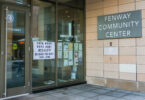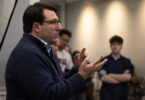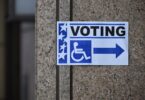By Alice Ferre
Boston University Statehouse Program
This article was originally published in South Coast Today.
NEW BEDFORD — Only 11.5 percent of New Bedford’s registered voters went to the polls in the Sept. 4 primary election. Although an improvement over the 3.5 percent turnout for the 2016 state primaries, this year’s turnout represents about 6,614 out of roughly 57,497 registered voters.
“A lot of people think their vote does not matter, and it is easier to stay at home and complain than go out and vote,” said New Bedford Election Commissioner Manuel DeBrito Jr.
State primaries “fell in line” with the timing of presidential primaries in 2016, DeBrito said, which might have been the reason for such little interest in this year’s state race.
“There are bigger personalities, the candidate drives voters. People are interested in what they see on the daily newspaper, social media,” he said. “But local elections make more of a change — in some races, there were just a couple of votes, and a couple of votes can make a change.”
A local state legislative primary was a key example. Chris Hendricks, an attorney at the Department of Industrial Accidents, edged out long-time Rep. Robert Koczera, D-New Bedford, from a seat he has occupied since 1989 representing Acushnet and parts of New Bedford’s North End.
Hendricks narrowly won in both communities, 690-681 in New Bedford and 356-341 in Acushnet, according to the Secretary of the Commonwealth’s website. More than 5,500 people failed to cast a vote in the race.
DeBrito said a loss of “the value of voting” over generations and the rise of social media as a pulpit for daily life frustrations can also help explain low participation.
“On Facebook, or on a show, there is that instant gratification, and they feel like it resonates more than voting,” he said.
Weymouth resident Brianna Medeiros, 28, said she did not vote during the primaries.
“I was just not informed enough, I just did not do enough research so I didn’t want to cast a vote. I really didn’t follow (the election),” Medeiros said.
Nancy Dourian, 53, from New Bedford, said she went to the polls this September and that she has done so since she became an eligible voter.
“Absolutely, I voted,” Dourian said. “It’s my civic duty, I’ve been voting since the day I was eligible to vote. I’ve been voting in pretty much every election.”
DeBrito said that participation might be higher on Nov. 6 as voters will voice their opinions about several polarizing ballot questions – notably Question 1, which would place a limit on the number of patients a nurse can have at a time.
“There seems to be a lot of interest in Question 1 when we were certifying signatures,” DeBrito said.
Early voting is one way the New Bedford Election Commission is trying to get people to cast their vote. Early voting periods, allowed by the state since 2014, extend Election Day for 11 days. Also, absentee balloting has long been allowed and this year 280 absentee ballots were cast for the primary that was held the day after Labor Day.
However, early voting does not apply to primaries, a reality that voting rights advocates believe should change.
“We think it should,” said Common Cause Massachusetts Executive Director Pamela Wilmot.
“But the rationale in the legislation for early voting was getting shorter lines on Election Day, and there are no lines in primaries.”
Common Cause is a nationwide organization that aims at registering citizens to vote while ensuring voters have access to polling places on Election Day and “improving the rules of voting so that they are more accessible, and fair and open to everyone,” Wilmot said.
Although the causes of low turnout are “hard to pinpoint,” she said, the day on which elections are held, non-competitive races or where there are no alternative ways to vote — such as vote-by-mail, which does not exist in Massachusetts — can affect turnout.
Wilmot added that participation could increase “if we could have fewer elections, have highly competitive ones and have a convenient election system. Not all of those things are likely to get accomplished any time soon,” she said. “But some of them will be, some of them are possible.”
She pointed out Massachusetts will join eight other states and the District of Columbia that allow automatic voter registration thanks to a law passed in August. It will take effect in 2020.
“The U.S. has amongst the lowest registered population to vote,” she said. “The first step is to get people registered so campaigns can reach out to them.”
Automatic voter registration would add 21,251 voters to New Bedford’s currently registered voters, based on the city’s population of residents 18 and older. But, said Wilmot, automatic registration only improves turnout. It does not guarantee it.
“In 2016, when the first state started with auto registration, they added 230,000 (voters) and 90,000 voted,” Wilmot said. “But that’s all those people that wouldn’t have voted.”
In some countries, elections days happen on weekends or voting is mandatory, but whether those systems would fit the U.S. is uncertain.
“There have been efforts to move Election Day to a weekend, but that has many other problems including religious objections,” Wilmot said.
“I don’t see a lot of political will for a fine for voting,” she added. “It would certainly make an impact … but whether that’s politically viable, I haven’t seen it. (Voting) is not only a right, it’s a duty but also something that people need to sort of choose.”





